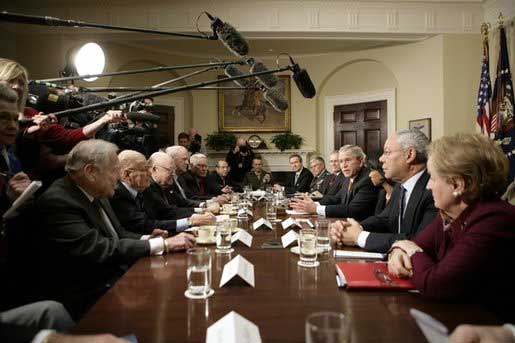 By JAMES ROSEN McClatchy Newspapers January 06, 2006
Suicide bombings and a roadside explosion killed at least 130 people Thursday, including five U.S. soldiers, a day after 32 Shiite Muslim mourners were slain at a funeral. After a period of relative calm in Iraq since Dec. 15 elections, the renewed violence reverberated in Washington, where President Bush on Wednesday had described a small drawdown of U.S. troops in Iraq and looked ahead to additional cuts later this year.  White House photo by Eric Draper.
"I see the terrorist attack as acknowledgement on the terrorists' part that this is a center of gravity and that they're losing," Pace told reporters at the Pentagon. Expanding his recent initiative to seek broader support for the U.S. military effort in Iraq, Bush met with a bipartisan group of 13 former secretaries of state and defense from presidential administrations stretching back more than four decades. "Not everybody around this table agrees with my decision to go into Iraq, I fully understand that," Bush said at the White House. "But these are good, solid Americans who understand that we've got to succeed now that we're there. And I'm most grateful for the suggestions that have been given. We take to heart the advice." Several of the former Cabinet members urged Bush to talk to Americans more often about Iraq, according to participants. Melvin Laird, who served as defense secretary under President Nixon, described the meeting as "a free exchange." Lawrence Eagleburger, secretary of state under Bush's father, said the president heard some "mild" criticism. "Some of the things he heard, he probably didn't like too well," Eagleburger told reporters after the meeting. Frank Carlucci, defense secretary under President Reagan, said the most outspoken participants were Laird, George Shultz (secretary of state under Reagan) and Madeleine Albright (secretary of state under President Clinton). "A lot of people urged the president to continue with the kind of speeches that he's been giving lately, explaining our policies, acknowledging that mistakes are and will be made, and that the course ahead is a tough course, but that we intend to succeed," Carlucci told MSNBC. Zalmay Khalilzad, U.S. ambassador to Iraq, and Gen. George Casey, commander of U.S. troops in Iraq, briefed the group via videoconference from Baghdad, while Pace joined the talks at the White House. In a speech Wednesday, Bush pointed to the elections three weeks ago as a watershed, noting increased voting by Sunnis and a larger security role for Iraqi forces. While he warned of continuing violence, Bush said Iraqis are seizing the opportunity to form a democratic government. Official results of the election are still being finalized, and the winning candidate slates will require weeks or even months of negotiations to form a governing coalition of Shiites, Sunnis and Kurds, Iraq's three main sects. Sunnis, a minority sect that held power under deposed dictator Saddam Hussein, have fueled the insurgency. The new outbreak of violence this week jolted Bush administration hopes that the Sunnis' increased participation in the election would sap the insurgents' strength. Lt. Col. Ray Millen, a strategic studies analyst at the U.S. Army War College in Carlisle, Pa., said the attacks were likely carried out by Sunni Muslims seeking to claim a prominent role in the Iraqi governing coalition now being formed in the wake of last month's elections. "The attacks are just being used to remind the officials in Iraq that they must include the Sunnis in the political process," Millen said. "The message is: Don't try to marginalize us, or this will continue." David Albright, a former U.N. nuclear weapons inspector in Iraq who is now head of the Center for Science and International Security in Washington, said some of the same people who voted might also be supporting the insurgency. "The problem is you can vote in the morning and bomb at night," he said. "The voting might help serve their needs and the bombing might help serve their needs at the same time. It's such an unstable situation, it's just very hard to predict the outcome." Jon Alterman, who served in the State Department during Bush's first term and is now an analyst with the Center for Strategic and International Studies in Washington, said the security situation in Iraq is very uneven, with some of the most dangerous areas located in and around Baghdad. "I was just talking with a Western ambassador in Baghdad," Alterman said. "He hasn't been out to a meal since March. It's hard to argue that the country's working when the capital's not safe." The real outcome of the elections, Alterman said, won't be known for some time. "We don't know who's going to be left out of the coalition and what the consequences are going to be," he said. "Until we get a much better sense of those things, we're going to have absolutely no clue of where Iraq is going as a country." Pace said he believes that violence will subside over the course of this year, but he acknowledged that the ultimate success or failure of the insurgents would depend on the Iraqi people. "It depends on how comfortable these terrorists feel moving about the towns and cities in Iraq," Pace said. "I think if the Iraqi people demonstrate to the terrorists that they're not welcome in their cities, that they're not welcome in their towns, that murderers . . . of fellow Muslims . . . are not welcome, that will reduce the number of people. But clearly there is enough munitions scattered around that country still that the capacity to attack will be there."
Publish A Letter on SitNews Read Letters/Opinions Submit A Letter to the Editor
|